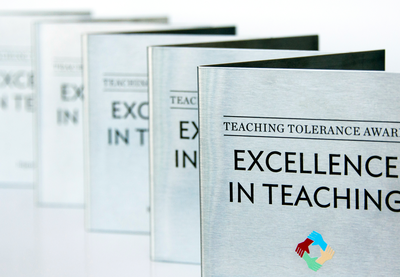We recently reached out to some recent winners of the Teaching Tolerance Award for Excellence in Teaching and asked them to share their experiences. We hope they serve as encouragement for you to apply for our 2020 award or nominate an outstanding educator.
Here are a few of their insights.
It’s not unusual to have doubts about applying.
One thing several of our awardees mentioned was an initial hesitation to apply. Many were nominated by others—colleagues or professional contacts.
Mayra Almaraz, a 2018 winner, ended up finding the application process itself inspiring. “I was nominated by my colleague,” she said. “When he told me he was going to nominate me, admittedly, I told him not to. I was the type of teacher who was conditioned to believe you don’t need recognition for doing the work you do because you do it not for others to notice but for your students.
“After much thought and deliberation, I chose to apply for the award. I applied because I felt that my story of how I teach difficult topics about race, privilege and equity needed to be told.”
Awardees become part of a network that helps them continue to grow.
Another point we heard from nearly all of the awardees we spoke with was that the award helped them build connections with a network of other social justice educators.
Before our last award cycle, Henry Cody Miller, a 2016 awardee, encouraged future applicants with the promise of connection.
“You will meet so many wonderful people!” he said, “Your teaching family will grow!”
According to our 2018 winners, his perspective was spot on.
“[After winning the award], I felt like my team of support and resources multiplied,” Almaraz explained. “And what’s even greater is that being in conversation about these topics helps you stay in learning mode. I wanted to read what my colleagues were reading. I wanted to learn more about topics and current issues that were happening across the country.”
Do you use research-based practices to help students develop positive identities of themselves, cultivate empathy and appreciate different perspectives, think critically about injustice, and develop the skills to take action against it? Do you know an educator who does?
Applications for the 2020 Teaching Tolerance Award for Excellence in Teaching are open until December 8! Learn more here.
Danna Lomax was nominated by her twin sister, a fellow teacher, and won in 2018. She cited the award summit, where winners gathered to share their work and learn from others, as an important opportunity. Awardees, she said, were able “to meet and learn from experts like Dr. Hasan Jefferies and Dr. Linda Tropp, as well as the other awardees and the members of the [Teaching Tolerance Advisory Board].”
“Once in contact with Teaching Tolerance,” she said, “I became even more aware of the amazing resources and inspirational people associated with TT.”
Rebecca Coven, another 2018 awardee, also mentioned continued learning as a benefit of the award. “Receiving the award connected me with a community of anti-bias and social justice educators—through the Teaching Tolerance Advisory Board and through the broader TT community—who have consistently challenged me and pushed me out of my comfort zone. They have helped me in my work to decenter my own whiteness and encouraged me to constantly reflect on how I can best serve my students.”
The award reaffirms the importance of social justice work in education.
Each of our awardees explained that the Teaching Tolerance Award for Excellence in Teaching served as an affirmation and an energizer. Our 2018 awardees said the award left them feeling supported and encouraged in their practice.
For Coven, the award showed that others saw the value of the student-led Mass Incarceration Symposium she featured in her portfolio. “I was incredibly honored to receive the nomination,” she said, “not only because it recognized the work that my students and I were doing but because the nomination acknowledged the importance of teaching about mass incarceration. I knew that if I were to receive the award, it would speak volumes about how teaching mass incarceration is a crucial part of understanding the ongoing narrative of racial oppression in our country.”
For Lomax, the award has opened doors. “My work has been amplified,” she told us. “I have been invited to present at the site, district, local, state and national levels. It has been an exciting year, and I am grateful for the opportunities that receiving this award has offered me.
“Elise Boulding, a feminist peace activist, says, ‘We cannot work for what we cannot imagine.’ In my work, I am imagining social, political, and economic justice in our community.”
And for Almaraz, the award provided some needed support. “The award definitely [helped] me stay true to the ideals of what I envisioned as a Teaching Tolerance educator,” she told us. “It encouraged me to continue to give power to my students’ stories, to continue to prove my solidarity to students in helping them understand and interrogate the world, creating an inclusive classroom environment by encouraging my students to bring their experiences to class so we may learn from each other, and examining systems of oppression and liberation.”


0 COMMENTS